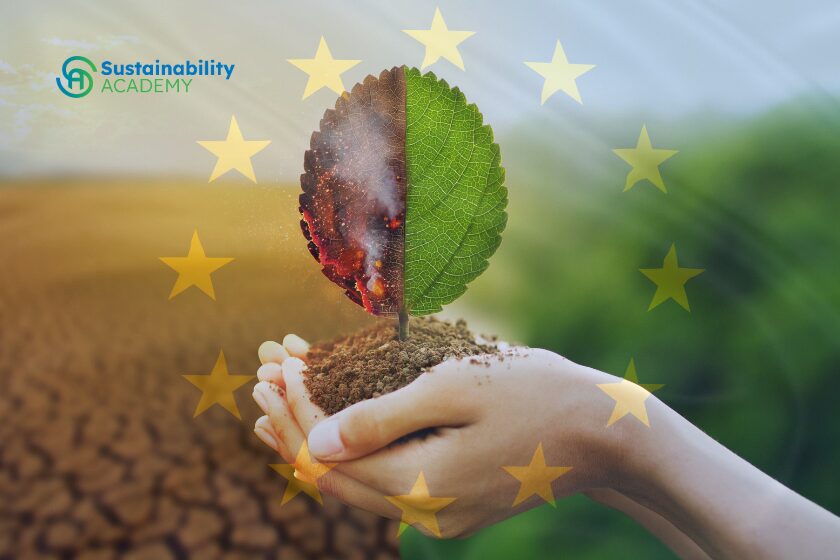A Milestone in Sight
The European Union (EU) is inching closer to achieving its 2030 climate goal—a 55% reduction in greenhouse gas (GHG) emissions compared to 1990 levels. This momentum, widely recognized as EU 2030 climate progress, reflects years of coordinated policy development, market innovation, and civil society engagement. According to the European Commission’s latest review of National Energy and Climate Plans (NECPs), member states are on course for a 54% reduction. While this may seem like a technicality, it carries major implications. For ESG professionals, the progress made so far is not just a policy benchmark—it’s a call to elevate strategic readiness and align business action with climate objectives.
EU 2030 Climate Progress by the Numbers
The EU’s emissions fell by a remarkable 8% in 2023 alone, a drop not seen since the COVID-19 lockdowns. In total, GHG emissions have declined by 37% since 1990, while the EU’s economy grew by 68% during that period (Reuters). This decoupling of emissions from economic growth shows that climate progress is compatible with prosperity.
Yet this success is not uniform. The energy sector, fueled by renewables now making up 24% of consumption, has led the way. Meanwhile, sectors such as agriculture and transportation have made negligible progress, with emission reductions of just 2% and 1% respectively (ESG Today). Furthermore, the land sector—which should act as a carbon sink—has struggled, storing less CO₂ due to deforestation and climate-fueled wildfires (ESG News). In fact, only six EU member states are currently on track to meet their land-based carbon removal targets.
Regulatory Momentum and ESG Readiness in the EU
As the EU nears its 2030 milestone, eyes are turning to the next horizon: 2040. The European Commission is drafting a target that could call for up to a 90% reduction in emissions. While this sounds ambitious, Bruegel analysts emphasize that such long-term goal-setting is essential for giving markets and companies the clarity they need to invest in decarbonization technologies.
For ESG professionals, this means increased regulatory expectations. The upcoming Corporate Sustainability Reporting Directive (CSRD) and European Sustainability Reporting Standards (ESRS) will demand disclosures on transition plans, Scope 1–3 emissions, climate risks, and resilience metrics. This is no longer just about reporting—it’s about strategy.
Benchmarking ESG Readiness Ahead of 2030
At CSE, we’ve developed a simple framework to help companies benchmark their ESG maturity: the ESG Readiness Spectrum. This model classifies organizations into three distinct stages:
- Reactive: Operating without dedicated ESG expertise, relying on minimal compliance.
- Adaptive: Beginning to integrate ESG into operations, often driven by investor pressure or early regulations.
- Transformational: Embedding ESG into core strategy, backed by skilled personnel, clear metrics, and scenario planning.
Understanding where an organization falls on this spectrum can help guide the steps needed to align with the EU’s accelerating climate agenda.
Closing the Skills Gap to Meet EU Climate Targets
Despite the EU’s progress, many companies remain underprepared. The Global Green Skills Report 2024 shows that demand for sustainability expertise is rising rapidly—up 40% year over year—but only 13% of professionals currently list any green skills in their profiles. ESG managers, supply chain officers, and board members often lack training in carbon management, climate risk, and green procurement.
This growing gap is not just a talent issue—it’s a business risk. Companies that lack in-house sustainability know-how may fall behind on compliance, lose investor trust, or be accused of greenwashing. Closing this gap requires not only hiring but also reskilling existing teams.
The Role of ESG Professionals in Meeting 2030 Climate Goals
Aligning Business Strategy with Policy
As the EU continues to build its Green Deal framework, ESG professionals are in a unique position to translate policy into business strategy. Rather than viewing regulations as checkboxes, leading companies are using them to create long-term value, boost innovation, and future-proof operations.
Focusing on High-Impact Sectors
Agriculture, buildings, and transport remain critical areas for action. ESG leaders in these sectors can push for electrification, alternative fuels, circular farming, and regenerative design—steps that contribute to systemic change. With climate targets tightening, incremental action is no longer enough.
Enhancing Transparency and Resilience
More than ever, stakeholders demand clarity and accountability. This means setting science-based targets, engaging with supply chains, and reporting with integrity. Transparency is not just about good PR—it’s a pillar of resilience. As climate risks intensify, companies that can measure and manage their exposure will have a competitive edge.
Final Thoughts
The EU 2030 climate progress achieved to date is both inspiring and instructive. It shows what’s possible when policy, innovation, and public pressure align. But it also highlights the work that lies ahead. The 2040 target will be even more ambitious. And the stakes—environmental, economic, and social—will be even higher.
For ESG professionals, this is a defining moment. Your role is evolving from reporter to strategist, from compliance officer to transformation leader. The decisions you make today will shape not just your company’s future, but that of the planet. Staying informed, agile, and well-equipped will be critical as we navigate this decisive decade.
Upskill to Lead: Training Opportunities from the Sustainability Academy
To meet the challenges ahead, ESG professionals must continually grow their expertise. The Sustainability Academy offers tailored, accessible programs that equip you with the knowledge to lead sustainability transformations confidently:
- Online Certificate on Carbon Reduction Strategy
Master carbon accounting, target-setting, and carbon neutrality practices. Ideal for professionals responsible for reducing emissions and aligning with net-zero goals.
Learn more
- Certified Climate Resilient Officer
Learn to assess, manage, and report climate risks in line with frameworks like TCFD and CSRD. Perfect for ESG and risk officers building climate adaptation strategies.
Explore the course
- Diploma on Sustainable Supply Chain Management
Strengthen your supply chain’s resilience through sustainable procurement, traceability, and circular practices. A must for procurement and operations leaders.
Enroll now
- Online Certificate on CSRD & ESRS
Stay ahead of the EU’s new reporting obligations with a detailed course on CSRD, ESRS, double materiality, and compliance essentials.
Get certified

